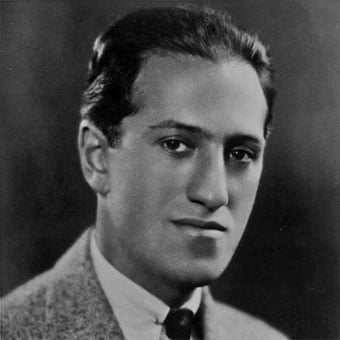
George Gershwin
d. 11 July 1937, Hollywood
George Gershwin wurde am 26. September 1898 im New Yorker Stadtteil Brooklyn geboren und erhielt 13jährig seinen ersten Musikunterricht. Zwei Jahre später brach er die Schule ab, um Klavier zu spielen und als „Song Plugger“ Kunden für neue Songs zu begeistern. Bald schrieb er auch eigene Songs; Swanee, gesungen von Al Jolson, brachte Gershwin ersten Ruhm. Doch erst in der Zusammenarbeit mit seinem älteren Bruder Ira wurden die beiden in den 20er Jahren zum beherrschenden Songwriter-Gespann auf dem Broadway. Aus ihren Federn entsprang eine Flut lebhafter, ansteckender Rhythmen und ergreifender Balladen. Die Worte fügten sich in unnachahmlichem Zusammenspiel zur Musik. Diese außerordentliche Zusammenarbeit führte zu einer Folge von 22 Musikkomödien, darunter Lady, Be Good! (1924), Oh, Kay! (1926), Funny Face (1927), Strike Up The Band (1927/30), Girl Crazy (1930) und Of Thee I Sing (1931), die erste Musikkomödie, die einen Pulitzerpreis gewann.
Im Laufe der Jahre fanden sich Gershwins Songs auch in zahlreichen Filmen und zwei preisgekrönten Musicals wieder, My One And Only (1983) und Crazy For You, das 1992 auf dem Broadway Premiere hatte. Crazy For You basiert im Wesentlichen auf Girl Crazy, mit einem neuen Libretto von Ken Ludwig, und bietet eine beeindruckende Palette von Georges und Iras Songs auf, zwei davon zuvor unveröffentlicht. Die West End-Premiere von Crazy For You war am 3. März 1993 am Prince Edward Theatre.
Von Beginn an hatte Gershwin den Ehrgeiz, auch ernste Musik zu komponieren. Schließlich bat ihn Paul Whiteman, ein neues Stück für ein besonderes Konzert mit moderner Musik zu schreiben, das am 12. Februar 1924 in der Aeolian Hall in New York stattfinden sollte. Gershwin, der gerade unter Hochdruck an einer Musikkomödie arbeitete, schaffte es kaum, die Rhapsody in Blue rechtzeitig fertigzustellen. Vom ersten tiefen Kichern der Soloklarinette und ihrem Aufwärtslauf jedoch, der einem einen Schauer über den Rücken laufen lässt, fing das Publikum Feuer, und eine neue Ära amerikanischer Musik hatte begonnen.
Im Jahr 1925 beauftragte der bedeutende Dirigent Walter Damrosch Gershwin mit einem Klavierkonzert für die New Yorker Symphonische Gesellschaft. Für viele ist das daraus entstandene Konzert in F Gershwins bestes Orchesterwerk. Andere Werke Gershwins, die auf der Beliebtheitsskala ganz oben stehen, sind Ein Amerikaner in Paris (1928) oder seine Zweite Rhapsodie für Klavier und Orchester, die er selbst 1932 als Solist mit dem Boston Symphony Orchestra unter Kussewitzki uraufführte.
In DuBose Heywards Roman Porgy, der ihn schon lange faszinierte, fand Gershwin die ideale Vorlage für eine Oper im Blues- und Jazz-Stil. Seine „Volksoper“ Porgy And Bess (geschrieben in Zusammenarbeit mit DuBose und Dorothy Heyward und Ira Gershwin) war das ambitionierteste Projekt der Gershwin-Brüder: Hier mussten unvergessliche Songs in eine dramaturgische Struktur eingebunden werden. Porgy And Bess kam erstmals am 30. September 1935 in Boston zur Aufführung, bevor am 10. Oktober die Broadway-Premiere erfolgte. Nach weiteren Aufführungsserien in den Jahren 1942 und 1953, der mehrere Welttourneen folgten, entstand 1959 eine bedeutende Verfilmung der Oper.
1937 war George Gershwin auf dem Höhepunkt seiner Laufbahn angelangt. Seine symphonischen Werke und drei Präludien für Klavier hatten in das Standardrepertoire der Konzertsäle Eingang gefunden, und seine leichteren Songs verschafften ihm immer größeren Ruhm und Reichtum. Am 11. Juli 1937, während er an der Partitur zu The Goldwyn Follies arbeitete, brach Gershwin plötzlich zusammen und starb an einem Gehirntumor. Er war noch keine 39 Jahre alt. Die Nachricht traf all die Menschen auf der Welt, die Gershwin nur durch seine Musik kannten, wie ein persönlicher Schock. John O’Hara fasste ihre Gefühle so zusammen: „George Gershwin starb am 11. Juli 1937, aber ich muss das nicht glauben, wenn ich nicht will.“
Heute werden Gershwins Werke immer häufiger gesungen und gespielt, weitaus häufiger als zur Lebzeit des Komponisten. Die Songs und Konzertstücke haben ihre Dauerhaftigkeit längst bewiesen und sind aus keinem Plattenkatalog mehr wegzudenken.´
Abdruckrechte
Diese Biographie kann kostenfrei in Konzertprogrammen abgedruckt werden mit folgendem Nachweis: Abdruck mit freundlicher Genehmigung von Warner/Chappell
